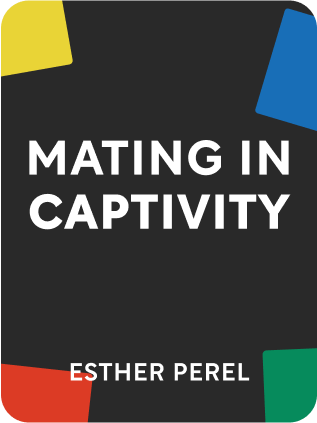

This article is an excerpt from the Shortform book guide to "Mating in Captivity" by Esther Perel. Shortform has the world's best summaries and analyses of books you should be reading.
Like this article? Sign up for a free trial here .
Are you looking for Mating in Captivity quotes by Esther Perel? What are some of the most noteworthy passages worth revisiting?
Making in Captivity by couples therapist Esther Perel offers a new, bold take on sex and intimacy in committed relationships. She reinforces that, although desire and love may have some fundamental contradictions, there are ways to balance the clashes, and ways to manage extra-relationship stresses.
The following Mating in Captivity quotes highlight some of the key ideas.
Mating in Captivity: Unlocking Erotic Intelligence
In Mating in Captivity, Esther Perel argues that love and desire aren’t driven by the same things. In fact, sometimes their ingredients are polar opposites. The ingredients for a loving, stable relationship are commitment, intimacy, and egalitarianism, while the ingredients for desire are mystery, distance, risk, and playfulness.
Throw in some external pressures such as cultural messages and parenthood, and it might seem impossible to have a good erotic life within a long-term relationship. However, couples therapist and relationship expert Esther Perel believes desire can survive in long-term relationships.
Below is a selection of top Mating in Captivity quotes that unpack some of the key ideas.
“… we expect our committed relationships to be romantic as well as emotionally and sexually fulfilling. Is it any wonder that so many relationships crumble under the weight of it all?”
In discussing intimacy, Perel draws the reader’s attention to the changing perceptions of romance throughout history. Two or three generations ago, people married for practical reasons and the central emotion was respect—if they fell in love later, it was a by-product or a bonus. People found intimacy in relationships outside of their marriage, often same-sex ones.
As social structures changed and work and family separated, people spent more time apart. They were lonely and looked for intimacy in romantic relationships. Notably, in social structures where people are close to other people (living with your extended family, living with a bunch of roommates), they have built-in closeness, and they’re less inclined to look for more intimacy in their romantic relationships.
In modern times, however, people expect their romantic partners to provide them with everything: security, romance, emotional intimacy, and sexual fulfillment. As a result, many relationships crumble from all this weight because people don’t know how to manage their expectations and balance these needs.
“Love enjoys knowing everything about you; desire needs mystery. Love likes to shrink the distance that exists between me and you, while desire is energized by it. If intimacy grows through repetition and familiarity, eroticism is numbed by repetition. It thrives on the mysterious, the novel, and the unexpected. Love is about having; desire is about wanting. An expression of longing, desire requires ongoing elusiveness. It is less concerned with where it has already been than passionate about where it can still go. But too often, as couples settle into the comforts of love, they cease to fan the flame of desire. They forget that fire needs air.”
According to Perel, love and intimacy—like security—are a modern-relationship-intangibles that conflict with sexual desire. Intimacy is based on familiarity, closeness, compassion, and comfort, potentially polar opposites of the fundamental ingredients of erotic desire: novelty, distance, and selfishness.
When you and your partner get so close that you’re now a fusion rather than two separate people, you no longer have anyone to connect with. You have to reintroduce distance if you want to reintroduce sexual desire. This can be psychological distance, for example, asking your partner to ignore you rather than immediately greet you when you get home from work. Or it can be literal—one of you leaves for a while. Either way, it can be helpful to think of the distance-creation as sexual play rather than a rejection. It can also help to remember that the closeness you and your partner have established gives you a strong foundation to return to.
“The grand illusion of committed love is that we think our partners are ours. In truth, their separateness is unassailable, and their mystery is forever ungraspable. As soon as we can begin to acknowledge this, sustained desire becomes a real possibility. It’s remarkable to me how a sudden threat to the status quo (an affair, an infatuation, a prolonged absence, or even a really good fight) can suddenly ignite desire. There’s nothing like the fear of loss to make those old shoes look new again.”
Many people have come to accept that passion fades over time in long-term relationships which is why committed sex life isn’t as fun and exciting as it is at the beginning of a relationship. According to Perel, this idea stems from the illusion that our partners are ours. She believes that rekindling desire can be more about perception. You acknowledge that the other person is the other person—a separate individual from you. It’s scary to do this because it makes your connection with them feel weaker. However, they have always been and always will be a separate person from you, so there’s not a lot of literal risks. Fear is a driver of desire, but so are curiosity and mystery—if you can find a way to look at your partner in a new light, in which they’re no longer a person you know, there’s space for desire.
“We are afraid that our adult sexuality will somehow damage our kids, that it’s inappropriate or dangerous. But whom are we protecting? Children who see their primary caregivers at ease expressing their affection (discreetly, within appropriate boundaries) are more likely to embrace sexuality with the healthy combination of respect, responsibility, and curiosity it deserves. By censoring our sexuality, curbing our desires, or renouncing them altogether, we hand our inhibitions intact to the next generation.”
When we try to hide sex to protect our children, they’ll learn that sex is something dangerous or bad. (our childhoods shape our feelings about desire.) Kids who learn to appropriately and easily express their affection are going to have a healthier relationship with sexuality when they grow up.
“Monogamy, it follows, is the sacred cow of the romantic ideal, for it is the marker of our specialness: I have been chosen and others renounced. When you turn your back on other loves, you confirm my uniqueness; when your hand or mind wanders, my importance is shattered. Conversely, if I no longer feel special, my own hands and mind tingle with curiosity. The disillusioned are prone to roam. Might someone else restore my significance.”
Both men and women choose monogamy because it means committing to one person, and that commitment shows love. To have you, your partner has rejected everyone else.
Even though over the past fifty years we’ve become far more open to new family structures such as childless relationships and same-sex marriage, monogamy is still the default, and, arguably, only option. We find divorce more acceptable than infidelity, even though divorce can have huge consequences for a family. We would rather end a relationship than restructure it. We make fidelity about an individual rather than the system (relationship or marriage). If we divorce someone, we think it’s because we chose the wrong person to be with. We don’t consider that it could instead be because a monogamous, high-expectation union has limitations, such as waning desire.
Interestingly, our culture only emphasizes monogamy in relationships. The values that lead to monogamy—being happy with what you have and commitment—are totally different from consumer culture—new, different, better.

———End of Preview———
Like what you just read? Read the rest of the world's best book summary and analysis of Esther Perel's "Mating in Captivity" at Shortform .
Here's what you'll find in our full Mating in Captivity summary :
- Why it's difficult to have a good, erotic life within a long-term relationship
- What makes up our individual sense of desire and our desire for our partners
- Tips on how to retain desire in a committed relationship






